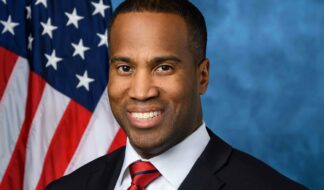Open Letter to Robert Gruss, Anti-Gay Catholic Bishop and My Neighbor
Please stop stigmatizing LGBTQ+ people. Please embody the values of gentleness and loving kindness your faith encourages.

This story is a response to the Prism & Pen writing prompt, Let’s Write Very Queer Letters to Politicians and Community Leaders!
Dear Robert,
I hope you don’t mind me calling you by your first name even though we don’t know one another. I’m writing you human to human, heart to heart, as your neighbor. I’d like to use your first name as a demonstration that I view you as an equal and as quite probably a kind and loving person — values I know your church and faith strongly encourage.
But I also write from a position of pain as a gay man who has often been stigmatized and scorned by men who hold office in the Roman Catholic Church.
Can we talk about it?
I’m writing because you and I are effectively neighbors in both the traditional Christian and the ordinary received sense. You live only about 90 minutes from me, but as you might have guessed, I’m writing about something that happened closer to home, only about 40 minutes away.
I’m 62 years old, Robert, and I was baptized a Catholic in small-town Ohio, where most of my extended family still practice the faith. (We avoid discussing the Michigan/Ohio football rivalry, which I’m sure you can appreciate!)
A cousin of mine who worked as a social worker for decades at a Catholic high school in rural Ohio recently quit her job and started attending Episcopal services. That broke her heart, actually, and she is one of the reasons I’m writing you.
The main reason I’m writing is because of controversy that recently embroiled the bucolic town of Beal City after Father Tom Held apologized to St. Joe parishioners for allowing Dominic Thrasher, a gay man, to read to preschool students from his popular book series about puppies. Dom is a local resident who started writing for small children during the pandemic. People love his gentle books, which are packed with wisdom about being kind and loving to family, friends and strangers.
Dom is gay, but he doesn’t write about that; you’d never guess from his children’s books.
Dom and his neighbors were thrilled by his unexpected publishing success. Getting a book into traditional print is like lightning striking! It’s a joyous occasion worth celebrating. (Of course, as a novelist who has yet to be traditionally published, I would say that, but I’m sure you understand.)
So, as Dom’s neighbors celebrated with him, a friend who teaches at the Father Tom’s parish school invited Dom to read to her class.
I’m sure you know the rest.
Some parishioners complained that an openly gay man had been allowed to read to children, and Father Tom responded by sending a letter to every parishioner and parent, apologizing for letting Dom read, assuring them he’d take steps to see that no openly gay person would ever address students again.
Can I be vulnerable, Robert? When I first read about that, I shed tears of pain and grief.
I admit I was angry too — but infinite, heavy sadness was my predominant emotion. I’m so tired, so bone weary, of being treated as a leper by respected religious leaders. (Who are supposed to care for metaphorical lepers, no?)
I’m so much more than a gay man, Robert, and so is Dom. I don’t know him personally, but his neighbors say he’s the salt of the earth — generous, kind and trustworthy.
I’d like to think I’m all three of those things too. I’m sure you realize that at my age as a gay man, I survived the worst of the AIDS crisis. Sometimes I feel guilty I’m still alive, because I’m exactly the wrong age to have understood the risk. Somehow, the virus didn’t find me, and I spent 10 years caring for friends and friends of friends as they struggled — often against great physical and emotional pain — to stay alive.
Most of them died despite my spoon-feeding, apartment cleaning, backrubs and love. They died despite my joining street activism to encourage safer-sex messaging, medical research and affordable access to lifesaving treatment.
But that’s another story for another day.
After that decade ended and effective treatment created something of a Lazarus effect in my closest circles, my beloved gay partner died, and I lost our home because we had been legally barred from marrying.
I left the country for a while, eventually fell in love again and raised a foster child with my new partner. Our son faced multiple physical and mental health challenges stemming from abandonment and severe abuse when he was an infant and toddler. (Trust me, you don’t want to know the details, though I’m sure you’ve heard similar stories.)
He wasn’t always easy to love, and all the experts warned us he would likely never recover, never be capable of leading a happy or fulfilling life.
But as we persevered with patience, gentleness and kindness, our son proved all the experts wrong. He began to thrive. Against all expectations, he made friends. Eventually, he discovered the joys of romantic love with a young woman he respected and treated like gold. Today, he’s a happy, healthy, gentle adult with children of his own.
I don’t say any of this, Robert, to pat myself on the back.
At every point in my life, I’ve done only what seemed necessary and morally virtuous. Often, I’ve made mistakes, like we all do. But I’ve done a lot to love my neighbor as myself and (even though I abandoned Christianity at the age of 16) to emulate the teachings and practices of Jesus.
That’s why I cried when Father Tom apologized for Dom’s reading and announced a policy that effectively removes him (and me!) from the pool of potential good neighbors in Beal City.
Father Tom’s apology reduced Dom (and me!) to one quite small characteristic — sexual orientation.
Robert, you supported Father Tom’s decision to ban people like me from parish classrooms, as if we are too toxic and dangerous to be in the presence of children. I understand I might be reducing your support to one unfair dimension, but I ask you to carefully examine how your support for homophobic stigmatization is itself one-dimensional and unjust.
If we got together for a beer and a chat, who would you see? The man who spent a decade caring for the grievously ill, expecting nothing in return? The man who spent years caring for a grievously wounded child despite suspecting I would not be able to truly help him?
Or would you only see a gay man who must be unwelcome in your diocese because of that single characteristic?
Robert, that’s why my cousin quit her job at a Catholic school and left her parish in tears to join an Episcopal congregation where she does not feel at home. She could no longer tolerate her bishop’s directives to reduce her gay and transgender students to one characteristic and to treat them with effective cruelty instead of gentle kindness.
She tried as hard as she could, and then she gave up, because her values of loving kindness and nurturing had become impossible for her to live out. She tells me she HAD to leave despite the pain, because she HAS to live out her core Christian values. Isn’t that interesting? Is that something you should think about, Robert?
Now I have something especially challenging to bring up, and I ask you to think about it carefully, withholding judgement and considering deeply.
Did you know seven Michigan high school boys recently stalked and beat a gay undergrad couple in the main MSU library? The boys didn’t like how the couple looked, apparently angered by their clothing, which they objected to for appearing gay.
The boys punched the couple while yelling anti-gay slurs, and they broke one of the young men’s fingers in the process.
One set of parents rushed up to East Lansing from Ann Arbor to drive the couple to the hospital. As you can imagine, everyone involved felt terrified and traumatized.
Here’s the challenging part, Robert: I believe you bear some indirect responsibility for that attack.
Oh, I know you probably deplore it and would urge your flock never to indulge in open hatred or violence. But did you know that teenage physical attacks on LGBTQ+ people have quadrupled in recent years from an already significant baseline?
Why?
Adults are talking, and children are listening. Modeling. Emulating.
And Robert?
You and Father Tom are some of the people they’re listening to.
What do you think children learn when you teach them by example that gay people are unfit to read books about puppies to other children? What do you think children learn when you promise parents that students will never again have to be in the presence of gay people?
Kids are smart. They often see past bullshit and drill right down to the heart of things — for better or worse.
I know the Catholic Catechism calls for avoiding unjust discrimination against LGBTQ+ people, and I know it calls for treating us with respect. But the same passage calls us depraved and disordered, ugly words very hard to reconcile with respect.
So, children look to you and other Catholic leaders to help them cope with the evident dissonance. When you show them gay people should be kept away from children, you resolve that dissonance in quite an ugly way.
In my opinion, you resolve it in favor of behavior a certain Jesus of Nazareth urged his followers to reject. (Remember him praising the traditionally reviled Samaritan?)
I don’t hold you directly responsible for the violence at Michigan State, but I urge you to accept indirect responsibility and to begin fostering dialogue to counter such sentiment and behavior. As an influential cultural and religious leader, you have a responsibility to work to enhance social cohesion, grow love and encourage kindness.
I believe you made a big mistake endorsing Father Tom’s stigmatizing behavior, but since we all make mistakes, I don’t think that makes you some kind of monster. I think it makes you someone who needs to learn and grow.
As your neighbor, I ask to you to thoughtfully consider my position. I don’t want to live in fear of violence, and I don’t deserve to — not because of anything special about me, but because I’m a human being for whom dignity and respect ought to be a birthright.
Dignitas Infinita, ring a bell?
If we ever do get together for that beer, maybe we can practice our Latin together and talk about love — about the human capacity for love and the need to encourage the practice of love.
What do you think, Robert? Am I making any sense?
Yours in hope,
James Finn
Former Catholic and current loving human being










